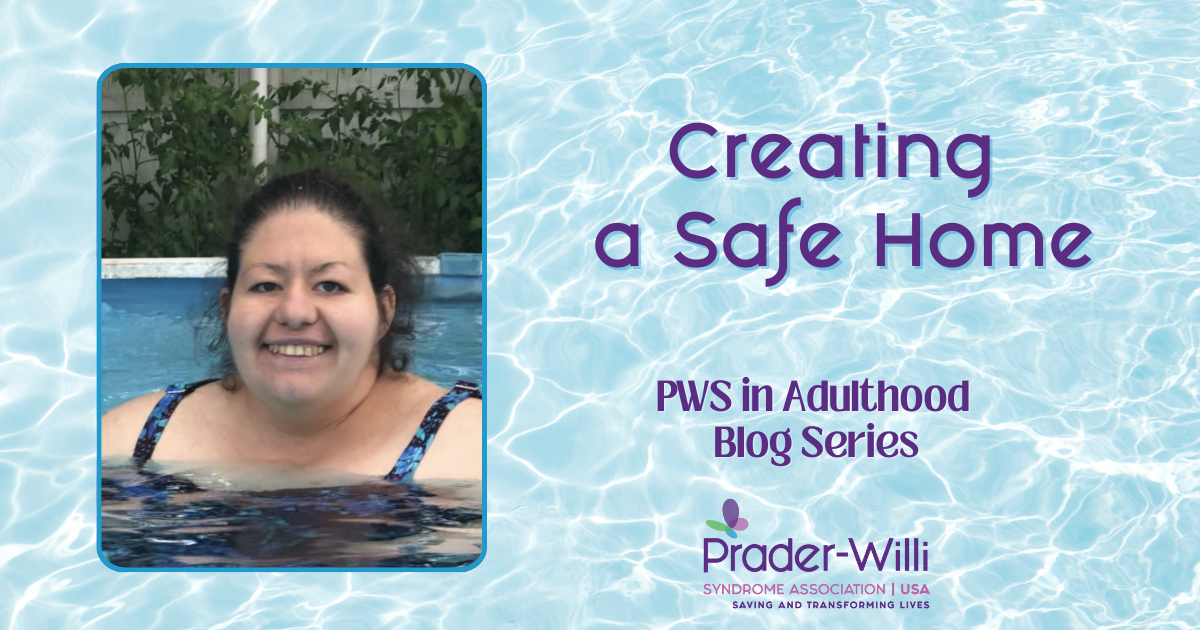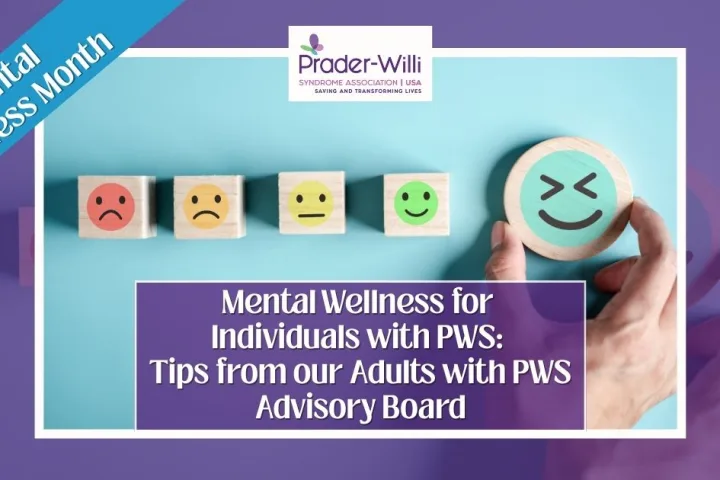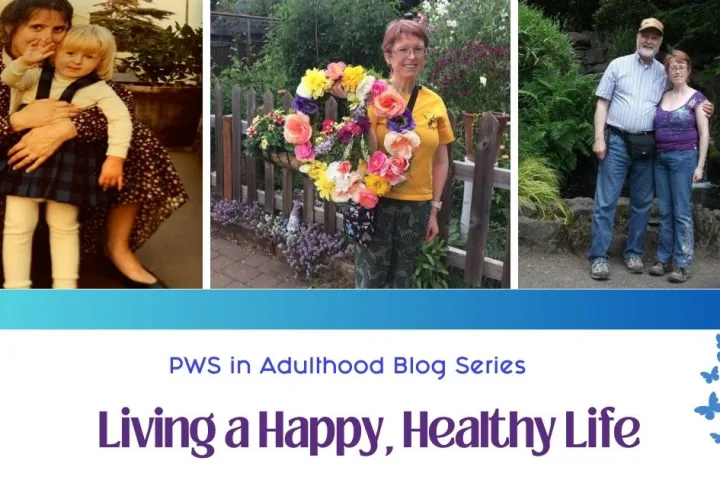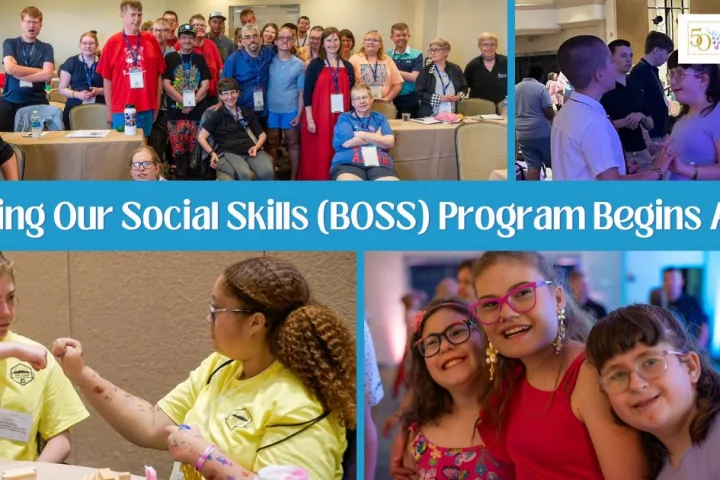contributed by Nancy Christoff
My daughter, Nicole (37) has PWS and has been living independently in Senior housing (a five-minute walk from my home) for about 10 years.
We’ve created a mini tailored group home without the group. I don’t know if a cat counts in the headcount – LOL.
Nicole gets lots of day & evening support from me and 4 personal care assistants (PCAs) that I hire (paid for by Northeast Arc & DDS). She also attends a Day program three days a week, with door-to-door transport.
This is Nicole’s home support:
Administrative Manager (That’s me).
- – Handle Nicole’s general & financial administration;
- – Schedule and transport/accompany Nicole to medical appointments;
- – Procure/interview/hire PCAs (paid for via Northeast ARC & DDS);
- – Procure Nicole’s frozen low salt/low calorie evening dinners;
- – Schedule, transport & conduct her aquatics therapy sessions at Spaulding Rehab.
Main PCA (1)
- – Handle all Nicole’s hands-on personal care, walking sessions, etc;
- – Perform Nicole’s housekeeping, fresh food shopping & prep, laundry, etc;
- – Transport and accompany Nicole to some local medical appointments.
Evening PCAs (3)
- – Alternate to perform nighttime prep for 2 hours each evening, which includes assisting Nicole with securing thigh-high compression stockings on her legs/feet (lymphedema), etc.
In the long term, staffing is a make or break issue for us. This model is unsustainable as I age and am no longer able to conduct this symphony, and/or if solid PCAs are not available.
However, the more important daily issues that we face are:
(1) Nicole is very naïve and trusting. She is unable to fully protect herself from scammers, online predators, and unscrupulous people. Since Nicole is her own guardian, there’s not much I can do to prevent this and usually end up having to clean up whatever mess ensues.
To try to curtail any future issues, I’ve notified the credit bureaus to prevent her from getting a credit card (I have power of attorney) and I supply her with a $20 per week allowance.
(2) Nicole’s ability to access food from external sources.
Well-meaning neighbors need a lot of convincing to understand – no food means no food.
We also try to mitigate this by limiting her disposable income (no credit cards, $20 per week for coffee – low calorie snacks, etc.).
And Nicole sees a nutritionist regularly for formal weigh-ins and coaching.
——————-
Is your loved-one an adult with PWS?
- – What steps did you take to prepare for their life as an adult?
- – What does independence look like for them?
- – What supports do they have in place?
- – Do they have romantic relationships and how are those maintained?
- – Do they work or volunteer in their community and what does that look like?
- – Do you have advice for parents on how and when to prepare for adulthood?
Share your story for our PWS in Adulthood Blog series by emailing africke@pwsausa.org.
Share this!





 Perry A. Zirkel has written more than 1,500 publications on various aspects of school law, with an emphasis on legal issues in special education. He writes a regular column for NAESP’s Principal magazine and NASP’s Communiqué newsletter, and he did so previously for Phi Delta Kappan and Teaching Exceptional Children.
Perry A. Zirkel has written more than 1,500 publications on various aspects of school law, with an emphasis on legal issues in special education. He writes a regular column for NAESP’s Principal magazine and NASP’s Communiqué newsletter, and he did so previously for Phi Delta Kappan and Teaching Exceptional Children. Jennifer Bolander has been serving as a Special Education Specialist for PWSA (USA) since October of 2015. She is a graduate of John Carroll University and lives in Ohio with her husband Brad and daughters Kate (17), and Sophia (13) who was born with PWS.
Jennifer Bolander has been serving as a Special Education Specialist for PWSA (USA) since October of 2015. She is a graduate of John Carroll University and lives in Ohio with her husband Brad and daughters Kate (17), and Sophia (13) who was born with PWS. Dr. Amy McTighe is the PWS Program Manager and Inpatient Teacher at the Center for Prader-Willi Syndrome at the Children’s Institute of Pittsburgh. She graduated from Duquesne University receiving her Bachelor’s and Master’s degree in Education with a focus on elementary education, special education, and language arts.
Dr. Amy McTighe is the PWS Program Manager and Inpatient Teacher at the Center for Prader-Willi Syndrome at the Children’s Institute of Pittsburgh. She graduated from Duquesne University receiving her Bachelor’s and Master’s degree in Education with a focus on elementary education, special education, and language arts. Evan has worked with the Prader-Willi Syndrome Association (USA) since 2007 primarily as a Crisis Intervention and Family Support Counselor. Evans works with parents and schools to foster strong collaborative relationships and appropriate educational environments for students with PWS.
Evan has worked with the Prader-Willi Syndrome Association (USA) since 2007 primarily as a Crisis Intervention and Family Support Counselor. Evans works with parents and schools to foster strong collaborative relationships and appropriate educational environments for students with PWS. Staci Zimmerman works for Prader-Willi Syndrome Association of Colorado as an Individualized Education Program (IEP) consultant. Staci collaborates with the PWS multi-disciplinary clinic at the Children’s Hospital in Denver supporting families and school districts around the United States with their child’s Individual Educational Plan.
Staci Zimmerman works for Prader-Willi Syndrome Association of Colorado as an Individualized Education Program (IEP) consultant. Staci collaborates with the PWS multi-disciplinary clinic at the Children’s Hospital in Denver supporting families and school districts around the United States with their child’s Individual Educational Plan. Founded in 2001, SDLC is a non-profit legal services organization dedicated to protecting and advancing the legal rights of people with disabilities throughout the South. It partners with the Southern Poverty Law Center, Protection and Advocacy (P&A) programs, Legal Services Corporations (LSC) and disability organizations on major, systemic disability rights issues involving the Individuals with Disabilities Education Act (IDEA), Americans with Disabilities Act (ADA), and the federal Medicaid Act. Recently in November 2014, Jim retired.
Founded in 2001, SDLC is a non-profit legal services organization dedicated to protecting and advancing the legal rights of people with disabilities throughout the South. It partners with the Southern Poverty Law Center, Protection and Advocacy (P&A) programs, Legal Services Corporations (LSC) and disability organizations on major, systemic disability rights issues involving the Individuals with Disabilities Education Act (IDEA), Americans with Disabilities Act (ADA), and the federal Medicaid Act. Recently in November 2014, Jim retired.